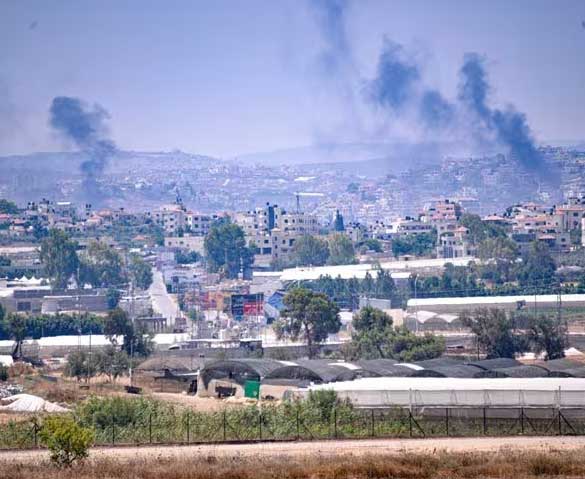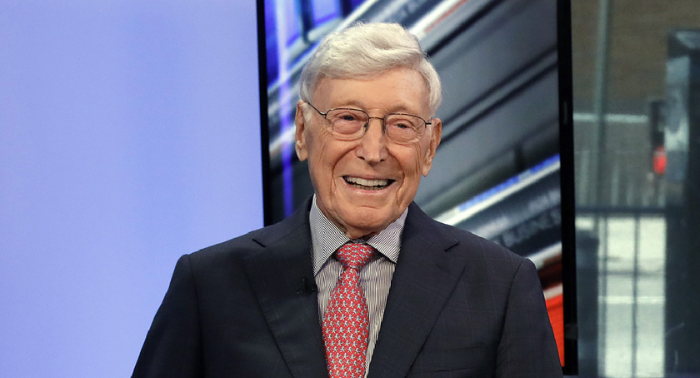Early Monday, Israel launched drone strikes on militant strongholds in the occupied West Bank and stationed hundreds of soldiers in the region. The offensive bore similarities to extensive military campaigns conducted during the second Palestinian uprising approximately twenty years ago. According to Palestinian health officials, at least eight Palestinians lost their lives, and many more were injured.
By Monday midday, troops persisted in their operations in the Jenin refugee camp. This marked the most extensive action in over a year of conflict, amidst increasing domestic demand for a strong reprisal following a series of assaults on Israeli settlers, including a shooting last month that claimed four Israeli lives.
As the military continued to forge ahead, plumes of black smoke filled the air over the congested streets of the camp, and the sounds of gunfire exchanges and overhead drones echoed. Residents reported electricity outages in certain areas, and military bulldozers clearing narrow streets, causing damage to buildings as they made way for Israeli forces. Condemnation of the violence came from Palestinians, neighboring Jordan and Egypt, as well as the 57-member Organization of Islamic Cooperation.
Israeli Defense Minister Yoav Gallant noted that the operation was “advancing as expected,” although he did not specify when it would conclude. Clashes persisted into midafternoon, roughly 14 hours post the initiation of Israel’s camp intrusion.
According to Lt. Col. Richard Hecht, an army spokesperson, an approximate force of 2,000 soldiers participated in the operation. He explained that military drones executed a series of strikes to facilitate the ground forces.
Despite recent isolated airstrikes in the West Bank, Hecht stated that Monday’s succession of strikes represented an escalation not seen since the termination of the Palestinian uprising in 2006.
Ambulances rushed to hospitals, carrying wounded victims from the smoke-filled, congested camp. Lynn Hastings, the U.N. humanitarian coordinator in the Palestinian territories, expressed her alarm over the scale of the Israeli operation on Twitter, particularly the airstrikes targeting a densely populated refugee camp. She mentioned that the U.N. was initiating humanitarian aid.
As reported by the official Palestinian news agency Wafa, the military obstructed internal camp roads, seized residences and buildings, and positioned snipers on rooftops, indicating that the operation might extend for a considerable duration.
Jamal Huweil, a political activist in the camp, opined that the operation would be unsuccessful. He stated, “They may demolish the refugee camp but will fail again because the sole resolution is the political solution that establishes a Palestinian state and terminates the occupation.”
The Palestinian Health Ministry confirmed the death of at least eight Palestinians, and injuries to 50 others, with 10 in a critical condition. A separate incident led to the death of a 21-year-old Palestinian due to Israeli gunfire near the West Bank city of Ramallah.
“Palestinians will persist in their stand against this brutal assault and will not surrender,” stated Palestinian presidential spokesperson Nabil Abu Rudeineh.
The Jenin camp and a nearby town with the same name have been points of contention as Israeli-Palestinian conflicts have surged since spring 2022.
Israeli foreign minister, Eli Cohen, blamed Iran for inciting the violence through funding to Palestinian militant groups. He stated that the operation would be implemented in a “focused manner” to avert civilian casualties.
Palestinians dispute such assertions, citing the violence as an organic response to more than half a century of occupation since Israel seized the West Bank in the 1967 Mideast war.
A previous point of major conflict during the last Palestinian uprising, Jenin has a longstanding reputation as a stronghold for armed resistance against Israel.
Following a rocket launch from the area last week and another violent face-off in Jenin a fortnight ago, Israel initiated Monday’s raid.
Leading figures from Prime Minister
Benjamin Netanyahu’s right-wing government, heavily influenced by West Bank settlers and their supporters, have been advocating for an extensive military response to ongoing regional violence.
Israeli military experts anticipate the operation to conclude rapidly, within a day or two at most, as prolonged violence and heavy casualties could elicit intensified international criticism and draw militants from Gaza Strip or even Lebanon into the conflict.
“If the Israeli aggression against Jenin does not cease, the Palestinian resistance will take necessary actions promptly,” warned Dawood Shehab, a spokesperson for the militant group Islamic Jihad.
The West Bank has witnessed the deaths of over 130 Palestinians this year, part of a significant surge in violence leading to some of the worst bloodshed in the region in almost two decades.
The violence intensified last year following a series of Palestinian attacks, prompting Israel to amplify its raids in the West Bank.
Israel justifies these raids as necessary to suppress militants. In contrast, Palestinians argue that such violence is inevitable given the absence of any political process with Israel and increased West Bank settlement construction and extremist settler violence.
Israel maintains that most of those killed have been militants, but stone-throwing protesters opposing the incursions and bystanders not involved in the confrontations have also lost their lives.
Since the beginning of the year, Palestinian attacks on Israelis have resulted in 24 fatalities.
The territories of the West Bank, East Jerusalem, and the Gaza Strip, seized by Israel during the 1967 Mideast war, are sought by the Palestinians for their prospective independent state.




